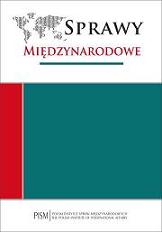Teoria zwycięstwa. Przegląd problematyki
The Theory of Victory: A Brief Outline of a Debate
Author(s): Robert KupieckiSubject(s): Politics / Political Sciences
Published by: PISM Polski Instytut Spraw Międzynarodowych
Summary/Abstract: Many researchers in the field of contemporary armed conflicts consider military victory the focal point of their analysis. Contrary to the bulk of scholarly war studies they do not limit themselves to pondering (in a technical sense) methods of achieving military victories and defeating the opponent on the battlefield. They challenge themselves intellectually in searching for such a theoretic framing of the issue that could be useful for democratic governments, and allow to understand how to transform military victories into durable, long-term political benefits (a better peace, to use the concept of sir Basil Liddel-Hart). The following article reflects on the contemporary scientific debate concerning the analytical framework of a theory of victory, including essential research questions, and emerging areas of concurrence and disagreement. Such a debate, reflected in a number of brilliant scholarly studies, does not constitute however a theory in the sense of a coherent conceptual system. It is not so rare in the realm of strategic studies, which contain so many inconclusive debates about the international alliances, strategy or security, to name just a few obvious concepts. Theory of victory research remains subject of continuous development, ranging from the modest intent to systemize basic terminology and concepts, to the point of open criticism of the military sciences, viewed as describing ways of winning wars, and falling short of investigating their sources and long-term consequences for the post-war era. Still, it does not belong to any of the great international relations theories. It challenges the traditional approach to the history of armed conflicts, but at the same time highly values the analysis of the past, which provides vital comparative substance for evaluation of the sources of modern military conflicts. Each type of war and their cultural context creates its own perception of victory—it is different in case of classic inter-state war, nuclear one or in the war on terrorism. It may also look differently on the tactical-operational and strategic levels as well as in the context of the grand strategy. The theory of victory, by emphasising the dynamics of the strategic victory, closely linked with the element of perception, through the flexible relation between (varying) aims of war and their real effects, encourages the continuing studies of conditions assuring lasting and favourable conclusion of the armed conflicts. In fact, it should be a contributing factor in any smart strategy for war ending and peace-building. It is both a postulate for further research effort and strategies for “a good peace”.
Journal: Sprawy Międzynarodowe
- Issue Year: 2013
- Issue No: 1
- Page Range: 5-30
- Page Count: 26
- Language: Polish

